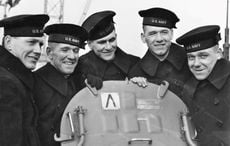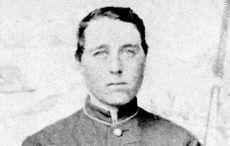- News / Liam, last of Clancy Brothers, dies in Ireland / Click here
- Tom Deignan column / Poignant last interview with Liam Clancy / Click here
- Paul Keating column / Clancy Brothers' Liam: The last man standing / Click here
- Paul Keating column / Tommy Makem's legend will live on / Click here
- Video / 'The Rising of the Moon' / Click here
- Video / 'Roddy McCorley' live / Click here
- Photos / Vintage photos from Irish America archive / Click here
Every Irish American who has ever listened to a note of Irish music probably has their defining moment when they realized what a hold the Clancy Brothers and Tommy Makem had on them, conscious or otherwise. Mine came decades after they first blazed a trail on the scene destroying all notions of what Irish folk music was and would be. Like the Beatles, they impacted a generation of us Irish boomers who moved from radio to TV in the 1960s and made us proud to be Irish when these four lads splashed across the screen on The Ed Sullivan Show and launched a highly successful career on their 15 minutes of fame on the popular show that was the American Idol of its day, giving rise to so many wonderful performers.
But it took a reunion concert in 1984 at Lincoln Center by the Clancys and Makem to make me realize how much they touched us, informed us and entertained us as 3,000 devoted audience members sang virtually the entire program with Liam, Paddy, Tom and Tommy that night after a performing hiatus of 15 years as troupe.
Such was their legacy and one memory that sprang to mind when I heard of the passing of Tommy Makem last Wednesday, August 1 in New Hampshire.
The modern day "Bard of Armagh" Tommy Makem was 74 years old when he lost his battle with lung cancer in his adopted home of Dover, the mill town where he first arrived 52 years ago to see what America had to offer.
He wouldn't be long for the mill work that his relatives had undertaken upon emigration, suffering a hand injury that curtailed that career path and led him to New York to see if there was any theater work that could be found that would suit his talents. He would meet up with Liam Clancy whom he first met in his native Keady, in South Armagh when Clancy accompanied folklorist Diane Hamilton there who was interested in the folk songs and collections of Makem's mother, Sarah who had established her own reputation as a "song-catcher."
Their friendship led to meeting with Liam's older brothers Tom and Paddy in the then burgeoning Greenwich Village folk and literary scene of the 1950s and 1960s, and their theatrical pursuits quickly turned to folk music when they realized that there was more money in it at that time.
However, their thespian skills came in handy as they interpreted a wide body of Irish folk songs and delivered them in an animated fashion adorned in the hallmark Aran sweaters that made them the talk of the nation, especially after they successfully exploited some extra airtime made available when another booked act failed to show on that nationally televised Sunday night staple, The Ed Sullivan Show.
A similarly successful Carnegie Hall engagement furthered their recording and performing careers as they had a historic run that lasted over a decade until Makem left the group in 1969 to pursue a solo career and raise a family with his wife Mary.
Makem continued to work on his own, though he did reunite with Liam Clancy to form a duo for a number of years until 1988 when they went their separate ways once again.
Over the years, he gave ample evidence that he was a talented artist in his own right as he continued to be a popular presence on the festival and folk music scene with his ready mix of humor, poetry, banjo and tin whistle that rounded out his rich textured baritone.
He gained recognition as a talented composer of songs also with "The Rambles of Spring," "Farewell to Carlingford" and "Gentle Annie" among the most popular and re-recorded by ardent followers of his music.
His most famous composition would be the deeply symbolic "Four Green Fields," which again spoke of Ireland as the old mother whose land was divided, which served as a signature song for him and many others who suffered through the civil rights abuses and violence that afflicted Northern Ireland towards the end of the 20th century. It was and is a classic song that depicts the history of that corner of the island, and one will always remember the vibrato in his own voice that added poignancy to the poetic lyrics and imagery.
Makem's work with the Clancys and on his own was highly prolific, and in recent years he took great pride and encouragement of his own sons, Shane, Conor and Rory who literally followed his performance footsteps as full-time entertainers, very much in the old fashioned folk idiom, though with more contemporary flourishes when they perform with the Spain brothers who add more instruments to the fray.
In the later stages of his career, Makem grew more reflective and thoughtful. He was involved in producing a few video documentaries of his native Ireland that sought to give more contexts to his musical and literary roots which have appeared on the Public Broadcasting System.
While his recordings and writings will assure him a lasting legacy on their own merits, there was another side of him that has sown very valuable seeds as well.
Makem was not only a consummate performer in concert, folk club and festivals, but he befriended so many performers and organizers along that route who found inspiration and camaraderie in this fellow traveler.
Coming from a rich oral tradition of poetry and song in South Armagh, including his own mother Sarah, he was very sympathetic to keeping the tradition alive and the work that went into it, so he often praised fellow musicians, concert and festival organizers who played a valuable part in keeping the music vibrant and relevant.
Some of that is captured vividly in John O'Brien Junior's "Festival Legends: Songs and Stories" (www.songsandstories.net) published last year with some behind the scenes stories from Makem and also Liam Clancy among others.
Makem took great delight in the continued revival of Irish folk and traditional music, relishing in the success of groups like Cherish the Ladies and its rambunctious leader, Joanie Madden, who was a good friend as well.
Making his way in America while the Clancys returned to Ireland, Makem was more of trailblazer for many of the entertainers who followed over here on the festival and club circuit and has been duly recognized as the "Godfather of Irish Folk Musicians."
In the week since he passed away, many tributes have surfaced online at various sites singing his praises or waxing nostalgic via You Tube, which is truly indicative of the vast impression he left on so many of us who saw or heard him perform over the 50 years in various settings.
We are fortunate that he left a rich legacy of recorded material, and it is safe to say that he will not be forgotten nor will his like be among us again. He just returned from his last visit to Ireland last month after being awarded an honorary doctorate at the University of Ulster.
Tommy Makem will be laid to rest this Thursday, August 9 in Dover, New Hampshire alongside his wife Mary, who passed away in 2001. We send our condolences to his children, Katie, Shane, Conor and Rory.




Comments